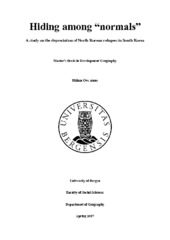Hiding among “normals” - A study on the depreciation of North Korean refugees in South Korea
Master thesis
Permanent lenke
https://hdl.handle.net/1956/15789Utgivelsesdato
2017-05-05Metadata
Vis full innførselSamlinger
- Department of Geography [634]
Sammendrag
The number of North Korean refugees in South Korea has now reached 30 000 – a number that continues to increase every year. Despite efforts to effectively integrate these displaced brothers and sisters through a custom-fit resettlement program, many studies show that refugees often struggle with this transition. The challenges of adapting to an unforgivingly cold and competitive society comes unexpected to most, leading to feelings of disillusionment and depression among the North Korean refugee population in South Korea. The aim of this study is to explore the challenges North Korean refugees are likely to face when resettling in South Korea, focusing on their socio-economic disadvantages and susceptibility to social prejudice. This was done by arranging two separate field trips to Seoul, South Korea, which included meeting and conducting interviews with North Korean informants. As such, this study is based on empirical evidence and data from published research material and official statistics, seen in relation with qualitative data collected by the author through ethnographic research methods. This paper suggests that the disadvantaged position of North Korean refugees in South Korea’s competitive society leaves them at risk of becoming socio-economically marginalized among their southern kin. It also finds that they tend to be stigmatized, which is demonstrated by their widespread application of stigma management, owing to historical and socio-political factors, as well as a general feeling of indifference and lack of awareness among South Koreans regarding the troubled situation of North Korean refugees. Consequently, this paper argues that the stigmatization of North Korean refugees, along with their socio-economical disadvantages, has resulted in their cultural disqualification from an overbearing and indifferent South Korean society.
